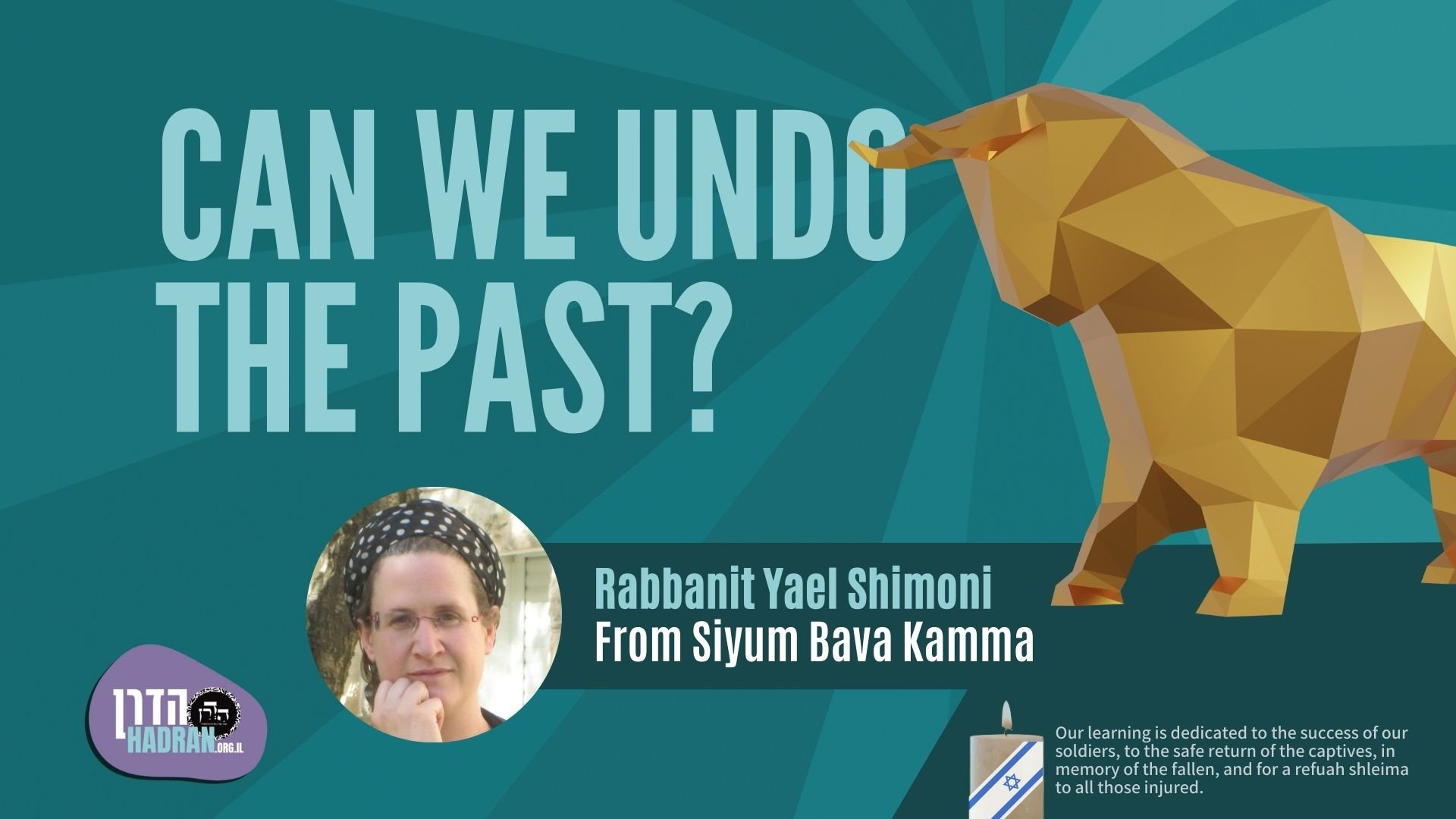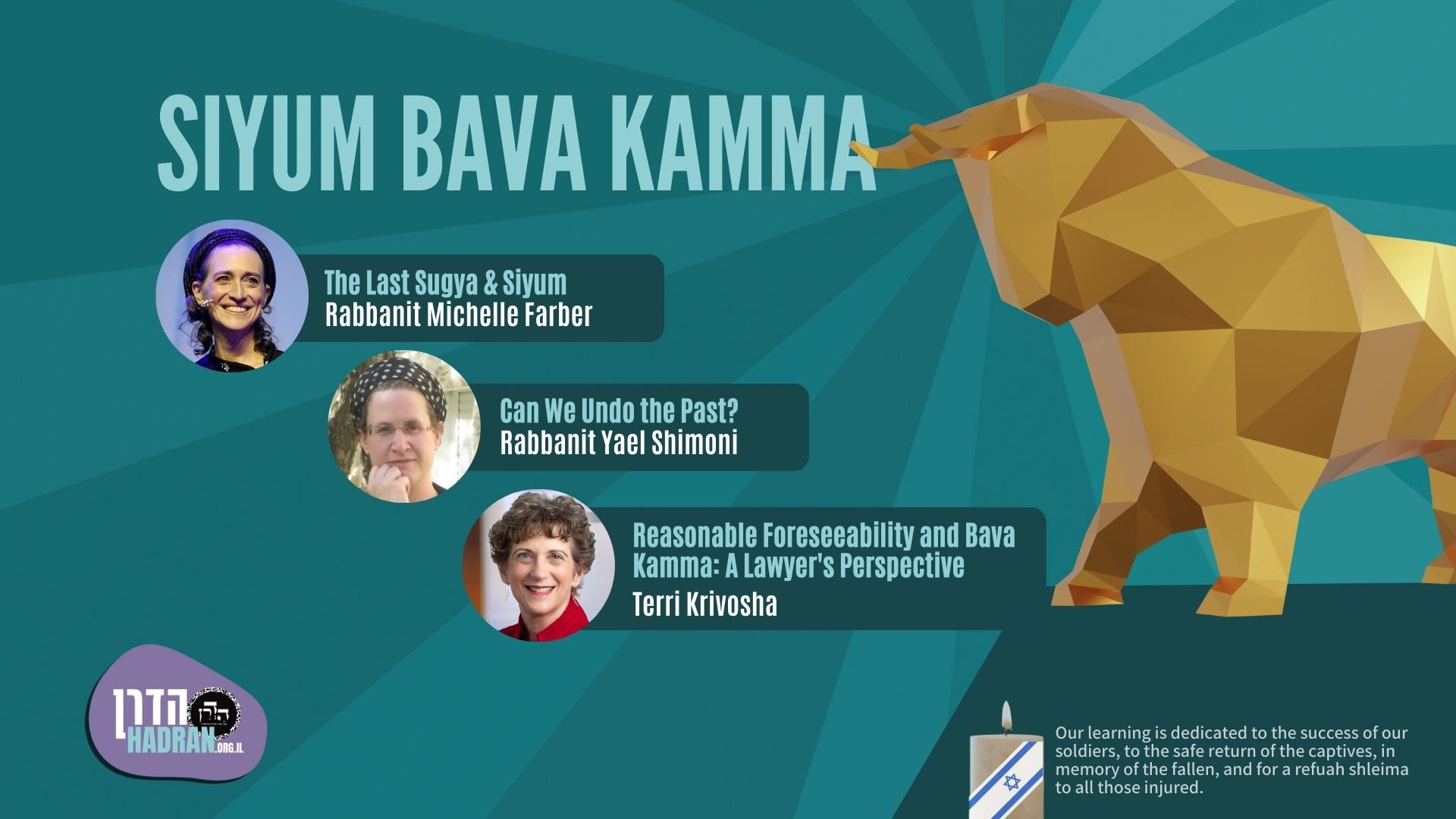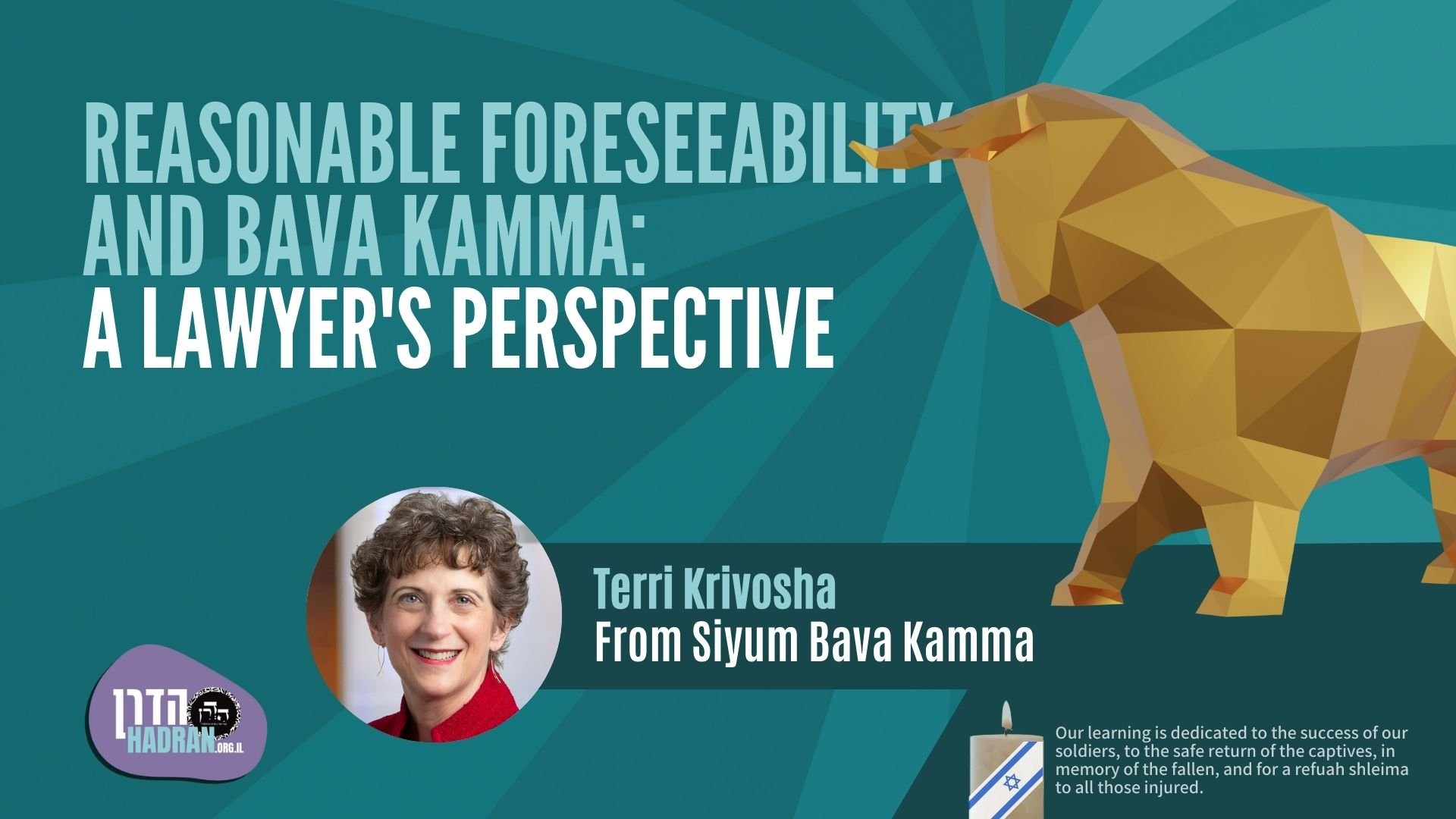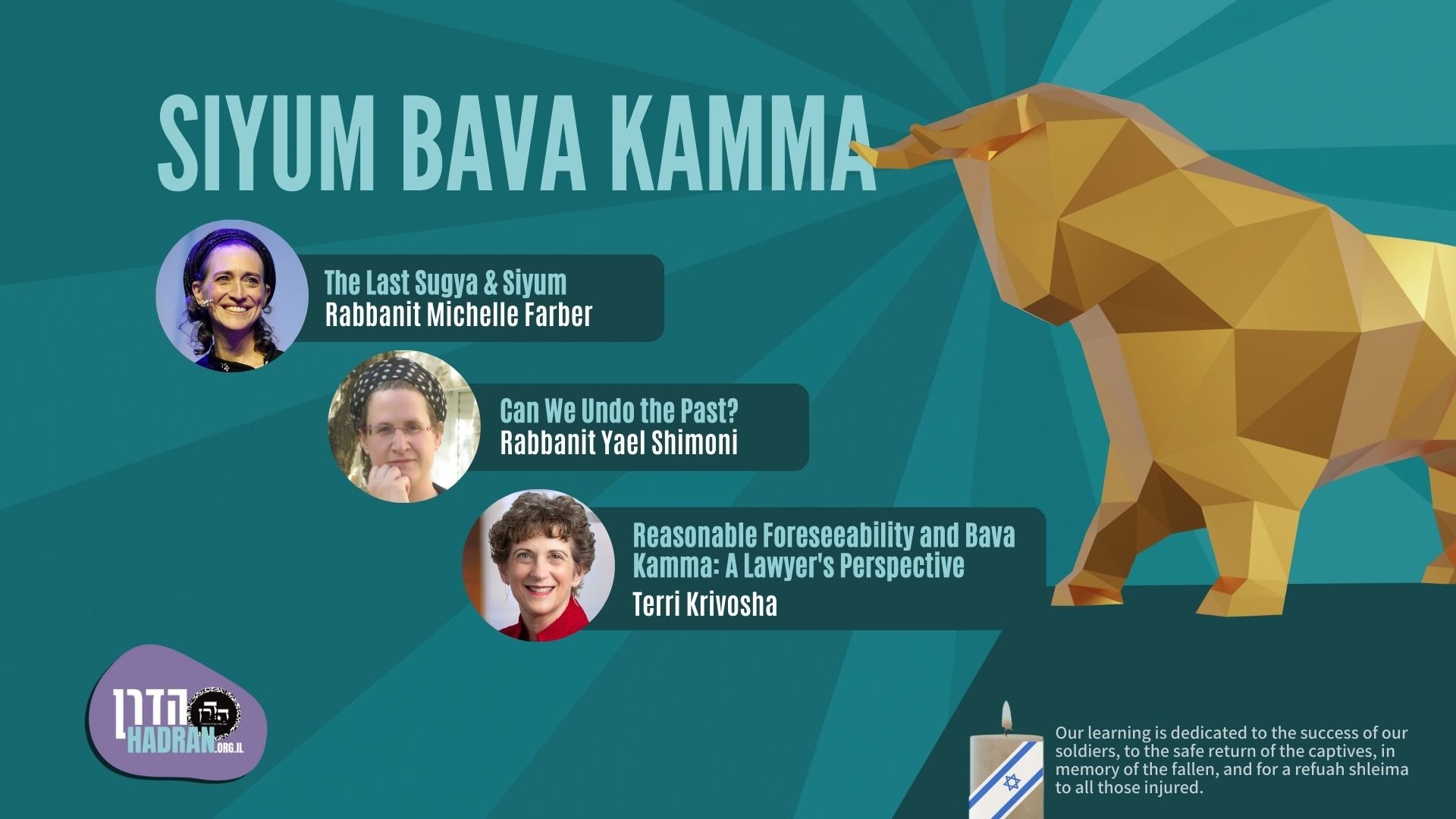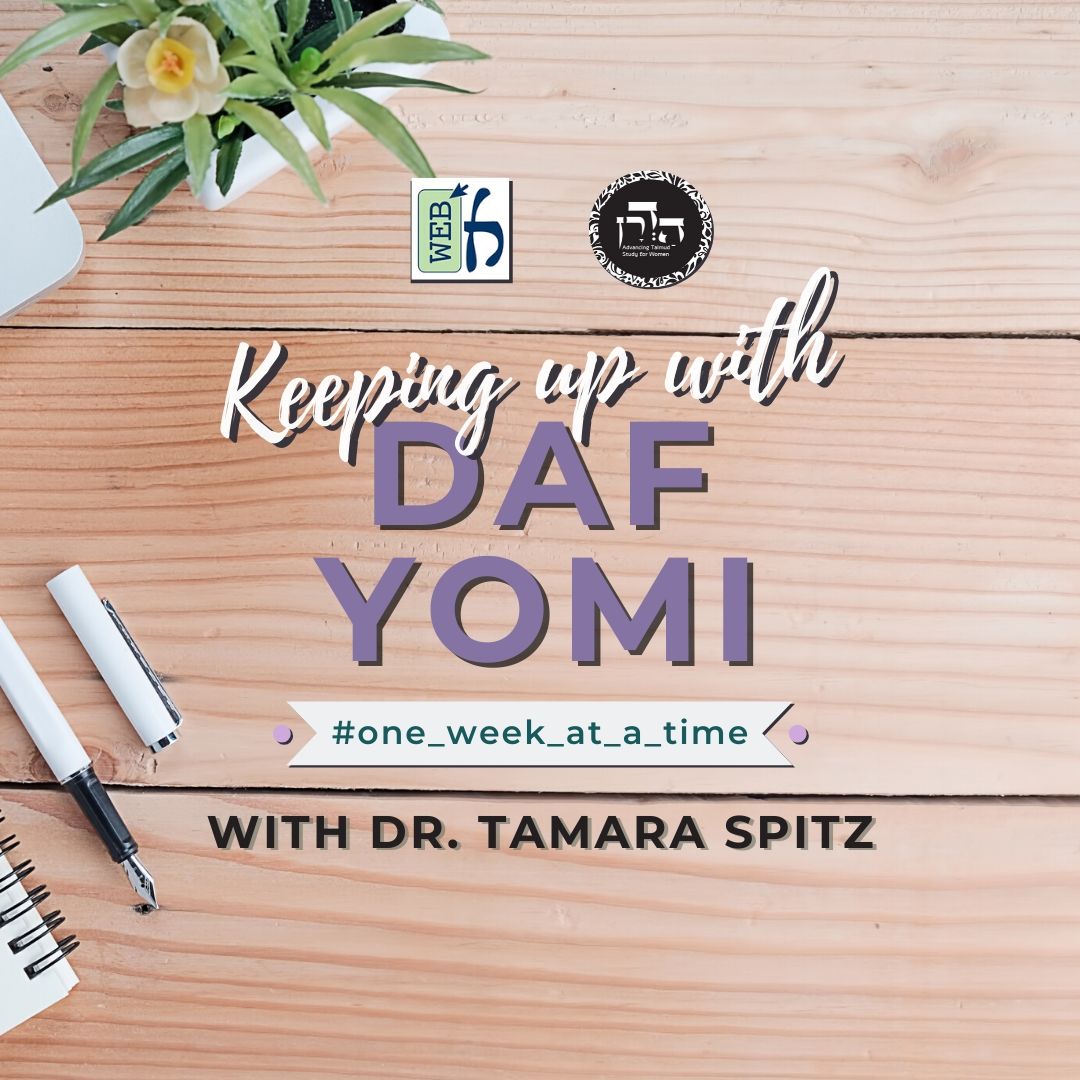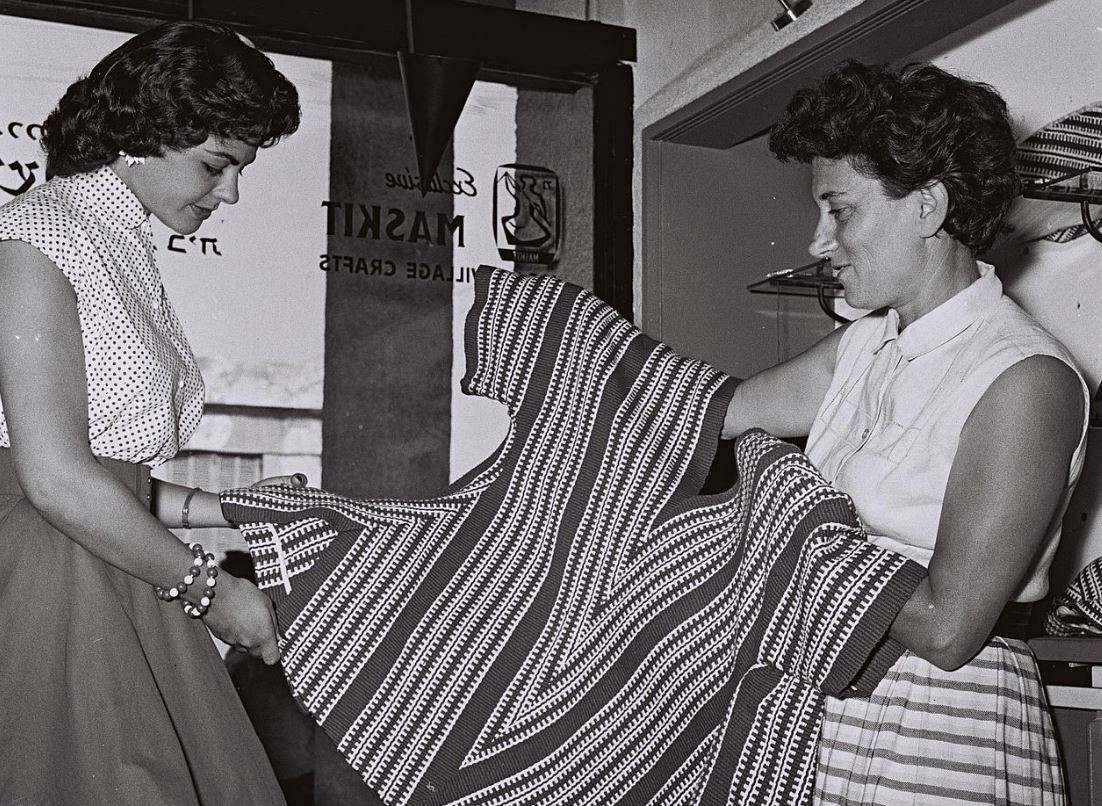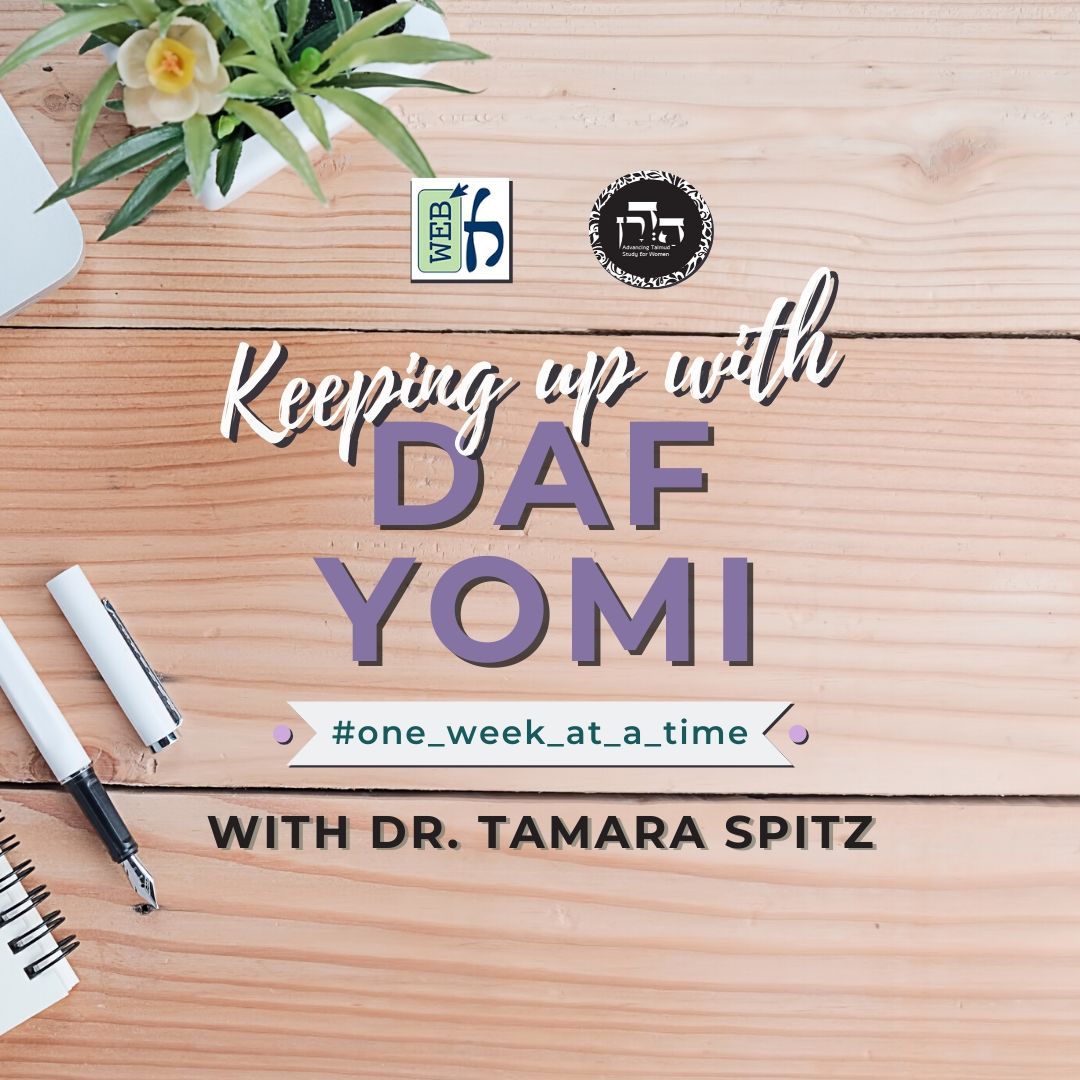Bava Kamma 64
כְּשֶׁהוּא אוֹמֵר ״שֶׂה״ – הֲרֵי שֶׂה אָמוּר, הָא מָה אֲנִי מְקַיֵּים ״גְּנֵיבָה״? לְרַבּוֹת כָּל דָּבָר.
When the verse states “sheep,” a sheep is thereby stated explicitly. Therefore, the detail of “ox” cannot be written to include specifically items that can be sacrificed on the altar, e.g., a sheep. How then do I realize the meaning of the word “theft,” i.e., what is the category of items derived from the detail and generalization? It must be that it serves to include all types of items in the requirement of double payment.
יֵאָמֵר ״שׁוֹר״, ״שֶׂה״ וּ״גְנֵיבָה״, וְהַכֹּל בַּכְּלָל! אִילּוּ כָּךְ, הָיִיתִי אוֹמֵר: מָה הַפְּרָט מְפוֹרָשׁ – דָּבָר הַקָּדוֹשׁ בִּבְכוֹרָה, אַף כֹּל דָּבָר הַקָּדוֹשׁ בִּבְכוֹרָה.
The baraita continues to analyze the verse: Let the verse state only “ox,” “sheep,” and “theft,” and in that manner everything would be included. Why is it necessary to write “donkey”? Had the verse been written in this manner, without “donkey,” I would have said: Just as the items mentioned in the detail, “ox” and “sheep,” are clearly defined as items that are subject to being sacred with the sanctity of the firstborn, so too any item that is subject to being sacred with the sanctity of the firstborn is subject to double payment, but not other items.
מָה יֵשׁ לְךָ לְהָבִיא – חֲמוֹר, כְּשֶׁהוּא אוֹמֵר ״חֲמוֹר״ – הֲרֵי חֲמוֹר אָמוּר, הָא מָה אֲנִי מְקַיֵּים ״גְּנֵיבָה״? לְרַבּוֹת כׇּל דָּבָר.
What is there for you to include in this category? A donkey. When the verse says “donkey,” a donkey is thereby stated explicitly. Therefore, the details of “ox” and “sheep” cannot be written to include specifically items that are subject to being sacred with the sanctity of the firstborn, e.g., a donkey. How then do I realize the meaning of the word “theft,” i.e., what is the category of items derived from the detail and generalization? It must be that it serves to include all types of items in the requirement of double payment.
יֵאָמֵר ״שׁוֹר״ וַ״חֲמוֹר״ ״שֶׂה״ וּ״גְנֵיבָה״ – וְהַכֹּל בַּכְּלָל! אִילּוּ כָּךְ, הָיִיתִי אוֹמֵר: מָה הַפְּרָט מְפוֹרָשׁ – בַּעֲלֵי חַיִּים, אַף כֹּל בַּעֲלֵי חַיִּים.
The baraita continues to analyze the verse: Let the verse state only “ox,” and “donkey,” and “sheep,” and “theft,” and in that manner all items would be included. Why is it necessary to write the word “alive”? Had the verse been written in this manner, I would say: Just as the items mentioned in the detail, “ox,” “sheep,” and “donkey,” are clearly defined as items that are animals, so too all animals are subject to double payment, but not inanimate objects.
מָה יֵשׁ לְךָ לְהָבִיא – שְׁאָר בַּעֲלֵי חַיִּים, כְּשֶׁהוּא אוֹמֵר ״חַיִּים״ – הֲרֵי חַיִּים אָמוּר, הָא מָה אֲנִי מְקַיֵּים ״גְּנֵיבָה״? לְרַבּוֹת כׇּל דָּבָר.
What is there for you to include in this category that is not already listed? Animals other than oxen, sheep, and donkeys. When the verse states the term “alive,” animals are thereby stated explicitly. Therefore, the details of “ox,” “sheep,” and “donkey” cannot be written to include animals. How then do I realize the meaning of “theft,” i.e., what is the category of items derived from the detail and generalization? It must be that it serves to include all types of items in the requirement of double payment. This is the end of the baraita.
אָמַר מָר: יֵאָמֵר ״שׁוֹר״ וּ״גְנֵיבָה״. מִי כְּתִיב ״שׁוֹר״ וּ״גְנֵיבָה״? ״גְּנֵיבָה״ וָ״שׁוֹר״ הוּא דִּכְתִיב!
There are several puzzling elements of the halakhic exposition of the verse in this baraita. The Gemara now seeks to explain it in detail. The Master said in the baraita above: Let the verse state only “ox” and “theft.” The Gemara objects: Are “ox” and “theft” written in the verse in this order, as a generalization and a detail? No, it is “theft” and then “ox” that is written. Consequently, the verse contains a generalization and a detail, in which case the generalization is understood to refer only to that which is specified in the detail.
וְכִי תֵּימָא ״אִילּוּ נֶאֱמַר״ קָאָמַר – אִילּוּ נֶאֱמַר ״שׁוֹר״ וּ״גְנֵיבָה״; וּמִי מָצֵית אָמְרַתְּ ״מָה הַפְּרָט מְפוֹרָשׁ״?! הָוֵה ״שׁוֹר״ פְּרָט וּ״גְנֵיבָה״ כְּלָל; פְּרָט וּכְלָל – נַעֲשָׂה כְּלָל מוֹסִיף עַל הַפְּרָט, וְאִיתְרַבּוּ לְהוּ כֹּל מִילֵּי!
And if you would say that the baraita is saying that this would be the case had the verse stated the words in this manner, i.e.: Had the verse stated “ox” and then “theft,” all items would have been included; how can you then proceed to say: Just as the item mentioned in the detail, “ox,” is clearly defined as an item that can be sacrificed on the altar, so too everything that can be sacrificed on the altar is subject to double payment? “Ox” is a detail and “theft” is a generalization, and according to the rules of hermeneutics, in such a case the generalization adds to the detail, and all items are included, not just items that resemble the detailed item.
אֶלָּא כְּדִכְתִיב קָאָמְרִי – ״גְּנֵיבָה״ וְ״שׁוֹר״. מִי מָצֵית אָמְרַתְּ ״הַכֹּל בַּכְּלָל״, אוֹ ״מָה הַפְּרָט מְפוֹרָשׁ״? הָוֵה לֵיהּ ״גְּנֵיבָה״ כְּלָל וְ״שׁוֹר״ פְּרָט; כְּלָל וּפְרָט – אֵין בַּכְּלָל אֶלָּא מַה שֶּׁבַּפְּרָט; שׁוֹר אִין, מִידֵּי אַחֲרִינָא לָא!
Rather, the baraita must be saying that the verse should be analyzed as it is actually written: First “theft” and then “ox.” Accordingly, how can you then proceed to say that all items would be included, or: Just as the item mentioned in the detail is clearly defined as an item that can be sacrificed on the altar, as the baraita states? This analysis is applicable only when there is a generalization, and a detail, and a generalization. In this verse “theft” is a generalization and “ox” is a detail. The rules of hermeneutics state that when there is only a generalization and a detail, there is nothing included in the generalization other than what is listed in the detail. In this case, one would necessarily conclude that if one steals an ox, yes, he is liable to pay the double payment for stealing it, but if one steals anything else, no, there is no double payment.
אָמַר רָבָא: תַּנָּא אַ״חַיִּים״ קָא סָמֵיךְ לֵיהּ, וּכְלָל וּפְרָט וּכְלָל קָאָמַר לֵיהּ.
Rava stated an explanation of the baraita: When the tanna suggested: Let the verse say “ox” and “theft,” and similar suggestions, he was relying on the word “alive” at the end of the phrase. He considered this word an additional generalization after the detailed items, and therefore he was saying that the phrase is to be treated as a generalization, and a detail, and a generalization. Consequently, it should have been sufficient for the verse to state merely “theft,” followed by “ox,” followed by “alive.” Why does the Torah specify further items?
וְהָא לָא דָּמֵי כְּלָלָא בָּתְרָא לִכְלָלָא קַמָּא! הָא תַּנָּא – דְּבֵי רַבִּי יִשְׁמָעֵאל הוּא, דִּכְהַאי גַּוְונָא דָּרֵישׁ כְּלָלֵי וּפְרָטֵי.
The Gemara questions this explanation: But the latter generalization is not similar to the first generalization. The first generalization, “theft,” is so general that it includes all items, whereas the latter generalization, “alive,” includes only animals. Consequently, the rule of a generalization, and a detail, and a generalization should not apply. The Gemara responds: This tanna, the author of this baraita, is of the school of Rabbi Yishmael, who expounds generalizations and details in a case like this. Even if the first generalization and the latter generalization are dissimilar, he interprets the verse as a generalization, and a detail, and a generalization.
וְהָכִי קָא קַשְׁיָא לֵיהּ: ״אִם הִמָּצֵא תִמָּצֵא״ לְמָה לִי? יֵאָמֵר ״שׁוֹר״ וּ״גְנֵיבָה״ וְ״חַיִּים״ – וְהַכֹּל בַּכְּלָל!
Rava continues his explanation of the baraita: And this is what the tanna found difficult at the end of the baraita: Why do I need the beginning of the verse to state: “If the theft shall be found [himmatze timmatze],” with the verb repeated? Rava now explains the entire baraita, from the beginning: Let the verse say “ox” and “theft” and “alive,” and all items would be included, in accordance with the rules of a generalization, and a detail, and a generalization. Why did the verse include other details?
אִילּוּ כֵּן, הָיִיתִי אוֹמֵר: מָה הַפְּרָט מְפוֹרָשׁ – דָּבָר הַקָּרֵב לְגַבֵּי מִזְבֵּחַ, אַף כֹּל הַקָּרֵב לְגַבֵּי מִזְבֵּחַ. מָה יֵשׁ לְהָבִיא – ״שֶׂה״, כְּשֶׁהוּא אוֹמֵר ״שֶׂה״ – הֲרֵי שֶׂה אָמוּר, הָא מָה אֲנִי מְקַיֵּים ״גְּנֵיבָה״? לְרַבּוֹת כׇּל דָּבָר.
The baraita answers this by saying: Had the verse been written in this manner, I would have said: Just as the item mentioned in the detail, “ox,” is clearly defined as an item that is sacrificed on the altar, so too everything that is sacrificed on the altar is subject to double payment, but not other items. What else is there for you to include in this category? A sheep. When the verse states “sheep,” a sheep is thereby stated explicitly. Therefore, the detail of “ox” cannot be written to include specifically items that can be sacrificed on the altar, e.g., a sheep. How then do I realize the meaning of the word “theft,” i.e., what is the category of items derived from the detail and generalization? It must be that it serves to include all types of items in the requirement of double payment.
יֵאָמֵר ״גְּנֵיבָה״ וְ״שׁוֹר״ וָ״שֶׂה״ וְחַיִּים״ – וְהַכֹּל בַּכְּלָל! אִילּוּ כֵּן, הָיִיתִי אוֹמֵר: מָה הַפְּרָט מְפוֹרָשׁ – דָּבָר הַקָּדוֹשׁ בִּבְכוֹרָה, אַף כֹּל דָּבָר הַקָּדוֹשׁ בִּבְכוֹרָה.
The baraita continues: Let the verse say only “theft,” and “ox” and “sheep” and “alive,” and all items would be included. Why is it necessary to write “donkey”? The baraita answers: Had the verse been written in this manner, without “donkey,” I would have said: Just as the items mentioned in the detail, “ox” and “sheep,” are clearly defined as items that are subject to being sacred with the sanctity of the firstborn, so too any item that is subject to being sacred with the sanctity of the firstborn is subject to double payment, but not other items.
מָה יֵשׁ לְךָ לְהָבִיא – חֲמוֹר, [כְּשֶׁהוּא אוֹמֵר ״חֲמוֹר״] הֲרֵי חֲמוֹר אָמוּר, הָא מָה אֲנִי מְקַיֵּים ״גְּנֵיבָה״? לְרַבּוֹת כׇּל דָּבָר.
What is there for you to include in this category? A donkey. When the verse says “donkey,” a donkey is thereby stated explicitly. Therefore, the details of “ox” and “sheep” cannot be written to include specifically items that are subject to being sacred with the sanctity of the firstborn, e.g., a donkey. How then do I realize the meaning of the word “theft,” i.e., what is the category of items derived from the detail and generalization? It must be that it serves to include all types of items in the requirement of double payment.
יֵאָמֵר ״גְּנֵיבָה״, וְ״שׁוֹר״, וָ״שֶׂה״, וַ״חֲמוֹר״, וְ״חַיִּים״ – וְהַכֹּל בַּכְּלָל! אִילּוּ כֵּן, הָיִיתִי אוֹמֵר: מָה הַפְּרָט מְפוֹרָשׁ – בַּעֲלֵי חַיִּים, אַף כֹּל בַּעֲלֵי חַיִּים.
The baraita then asks: Let the verse say only “theft,” and “ox,” and “sheep,” and “donkey” and “alive,” and in that manner all items would be included. The baraita answers: Had the verse been written in this manner, I would say: Just as the items mentioned in the detail, “ox,” “sheep,” and “donkey,” are clearly defined as items that are animals, so too all animals are subject to double payment, but not inanimate objects.
מָה יֵשׁ לְךָ לְהָבִיא – שְׁאָר בַּעֲלֵי חַיִּים; כְּשֶׁהוּא אוֹמֵר ״חַיִּים״ – הֲרֵי חַיִּים אָמוּר, הָא מָה אֲנִי מְקַיֵּים ״גְּנֵיבָה״? לְרַבּוֹת כׇּל דָּבָר; ״אִם הִמָּצֵא תִמָּצֵא״ לְמָה לִי?
What is there for you to include in this category that is not already listed? Animals other than oxen, sheep, and donkeys. When the verse states “alive,” animals are thereby stated explicitly. Therefore, the details of “ox,” “sheep,” and “donkey” cannot be written to include animals. How then do I realize the meaning of “theft,” i.e., what is the category of items derived from the detail and generalization? It must be that it serves to include all types of items in the requirement of double payment. If so, why do I need the phrase “if the theft shall be found [himmatze timmatze]”? This is the conclusion of the baraita as explained by Rava.
אִי הָכִי, שַׁפִּיר קַשְׁיָא לֵיהּ!
The Gemara asks: If so, if this is how the baraita is to be understood, the difficulty it posed is valid, as the baraita ends with an unanswered question: Why do I need the phrase: “If the theft shall be found”?
מִשּׁוּם דְּאִית לֵיהּ פִּירְכָא: לְרַבּוֹת כׇּל דָּבָר מֵהֵיכָא קָמַיְיתֵי לֵיהּ – מִכְּלָל בָּתְרָא; כְּלָלָא גּוּפֵיהּ ״חַיִּים״ כְּתִיב בֵּיהּ!
The Gemara answers: This phrase is necessary because there is a refutation for the derivation cited in the baraita, as follows: From where in the verse does the tanna derive that it means to include all types of items? From the latter generalization of “alive.” But in the latter generalization itself the word “alive” is written.
כְּלָל וּפְרָט וּכְלָל מַאי קָא מַהֲנֵי לֵיהּ? אִי לְאֵתוֹיֵי כׇּל דָּבָר, הָא ״חַיִּים״ כְּתִיב – בַּעֲלֵי חַיִּים אִין, מִידֵּי אַחֲרִינָא לָא! מִשּׁוּם הָכָא אִיצְטְרִיךְ ״אִם הִמָּצֵא״.
What does the principle of a generalization, and a detail, and a generalization accomplish, i.e., what does it include in the halakha of double payment? If it is written to include all types of items, this cannot be, as the word “alive” is written in the verse, indicating that if one steals animals, yes, he is liable to pay double payment, but if he steals something else, i.e., inanimate objects, no, he is not liable to pay double payment. Due to this reason, it was necessary for the Torah to include the phrase: “If the theft shall be found [himmatze timmatze],” which includes all items, through the principle of a generalization, and a detail, and a generalization.
אָמְרִי: וְהָא שְׁנֵי כְלָלוֹת דִּסְמִיכִי אַהֲדָדֵי נִינְהוּ! אָמַר רָבִינָא, כִּדְאָמְרִי בְּמַעְרְבָא: כׇּל מָקוֹם שֶׁאַתָּה מוֹצֵא שְׁנֵי כְלָלוֹת הַסְּמוּכִים זֶה לָזֶה – הַטֵּל פְּרָט בֵּינֵיהֶם, וְדוּנֵם בִּכְלָל וּפְרָט.
The Sages state an objection: But these repeated verbs are two generalizations that are adjacent to each other in the verse, and the details follow both of the generalizations. Consequently, it is not a case of a generalization, a detail, and a generalization, but rather of a generalization, a generalization, and a detail. Ravina said: It is as they say in the West, Eretz Yisrael: Any place in the Torah where you find two generalizations adjacent to each other, place the detail between them and then treat them as a generalization, and a detail, and a generalization.
שְׁדִי ״שׁוֹר״ בֵּין ״הִמָּצֵא״ לְ״תִמָּצֵא״ – לְאֵתוֹיֵי מַאי? אִי לְאֵתוֹיֵי בַּעֲלֵי חַיִּים, מֵ״חַיִּים״ נָפְקָא! אֶלָּא לְאֵתוֹיֵי דָּבָר שֶׁאֵין בַּעֲלֵי חַיִּים, וּדְרוֹשׁ הָכִי: מָה הַפְּרָט מְפוֹרָשׁ – דָּבָר הַמִּטַּלְטֵל וְגוּפוֹ מָמוֹן, אַף כֹּל דָּבָר הַמִּטַּלְטֵל וְגוּפוֹ מָמוֹן.
The Gemara applies this principle to the verse: Place the first detail, “ox,” between “himmatze” and “timmatze,” and treat the verse as a generalization, a detail, and a generalization, so that other items that resemble the detail are included. To include what? If it serves to include animals, this is not necessary, as animals are derived from the word “alive” later in the verse. Rather, it serves to include an item that is not an animal, i.e., inanimate objects, and this is how you should expound the verse: Just as the items mentioned in the detail are clearly defined as movable property and are items that have intrinsic monetary value, so too anything that is movable property and has intrinsic monetary value is included, to the exclusion of land and financial documents.
וְתוּ שְׁדִי ״חֲמוֹר״ בֵּין ״הִמָּצֵא״ לְ״תִמָּצֵא״ – לְאֵתוֹיֵי מַאי? אִי לְאֵתוֹיֵי דָּבָר שֶׁאֵין בַּעֲלֵי חַיִּים, מִשּׁוֹר נָפְקָא! אֶלָּא לְאֵתוֹיֵי דָּבָר מְסוּיָּים.
And furthermore, following this method, place the next detail, “donkey,” between himmatze and timmatze, and treat it as a case of a generalization, a detail, and a generalization, so that other items that resemble the detail are included. To include what? If it serves to include an item that is not an animal, this is not necessary, as it already was derived from the word “ox.” Rather, it serves to include an object that is clearly delineated, to the exclusion of objects that are not clearly delineated in size or quantity.
אִי הָכִי, ״שֶׂה״ לְמָה לִי? אֶלָּא רִיבָּה וּמִיעֵט וְרִיבָּה הוּא, כִּדְתָנָא דְּבֵי רַבִּי יִשְׁמָעֵאל.
The Gemara asks: If that is so, if this is the correct way to analyze the verse, why do I need the verse to state “sheep”? There is nothing left to include. Rather, this whole approach must be rejected, and a new method of analysis applied, as follows: It is not treated as a case of a generalization, and a detail, and a generalization; rather, it is treated as a verse that amplified, restricted, and amplified, as the school of Rabbi Yishmael taught.
דְּתָנָא דְּבֵי רַבִּי יִשְׁמָעֵאל: ״בַּמַּיִם״ ״בַּמַּיִם״ שְׁתֵּי פְּעָמִים – אֵין זֶה כְּלָל וּפְרָט, אֶלָּא רִיבָּה וּמִיעֵט וְרִיבָּה; רִיבָּה הַכֹּל.
As the school of Rabbi Yishmael taught, concerning the verse: “These may you eat of all that are in the waters: Whatever has fins and scales in the waters, in the seas, and in the rivers” (Leviticus 11:9), as follows: The verse states: “In the waters,” “in the waters,” two times and only afterward lists the details of seas and rivers. This is not expounded as a generalization, and a detail, and a generalization, because the detail does not appear between the generalizations. Rather, the verse amplified, and then restricted, and then amplified, and thereby amplified the general category “waters” to include everything except for “seas” and “rivers,” the specific matter excluded in the restriction. Here too, since the two generalizations are written before the details, it is expounded as an amplification, a restriction and an amplification.
מַאי רַבִּי – רַבִּי כֹּל מִילֵּי? אִי הָכִי, כֹּל הָנֵי פְּרָטֵי לְמָה לִי? חַד לְמַעוֹטֵי קַרְקַע, וְחַד לְמַעוֹטֵי עֲבָדִים, וְחַד לְמַעוֹטֵי שְׁטָרוֹת. ״גְּנֵיבָה״ וְ״חַיִּים״ – לְכִדְרַב, דְּאָמַר: אַחֲיַיהּ לְקֶרֶן כְּעֵין שֶׁגָּנַב.
What do the generalizations himmatze and timmatze include? Do they include all items? If so, why do I need all these details of ox, sheep, and donkey? One detail serves to exclude land, and one serves to exclude Canaanite slaves, and one serves to exclude financial documents. The words “theft” and “alive [ḥayyim]” do not serve to exclude further items from double payment, but to indicate the halakha taught by Rav, who says: If one stole an item, and it deteriorated or its value decreased, he must revive [aḥayah] the principal to the value it had as of the time when he stole it, i.e., he must repay the owner according to the value of the item at the time it was stolen.
וּלְמַאן דְּאָמַר חַד בְּגַנָּב וְחַד בְּטוֹעֵן טַעֲנַת גַּנָּב, וְגַנָּב עַצְמוֹ נָפְקָא לֵיהּ מֵ״אִם יִמָּצֵא הַגַּנָּב״, הַאי ״אִם הִמָּצֵא תִמָּצֵא״ מַאי דָּרֵישׁ בֵּיהּ?
§ Until this point, the Gemara has been discussing the source of the obligation of a thief to pay double payment according to the baraita (63b) that maintains that both verses (Exodus 22:6–7) are referring to a bailee who falsely claims that a deposit was stolen from him. The Gemara asks: And according to the one who says that one of the two verses is speaking about a thief and one verse is speaking about a bailee who falsely states the claim that a thief stole from him, and he derives that a thief himself must pay double payment from the phrase “if the thief shall be found” (Exodus 22:6), what does he derive from this verse: “If the theft shall be found” (Exodus 22:3)?
מִבְּעֵי לֵיהּ לְכִדְרָבָא בַּר אֲהִילַאי, דְּאָמַר רָבָא בַּר אֲהִילַאי: מַאי טַעְמָא דְּרַב, דְּאָמַר: מוֹדֶה בִּקְנָס וְאַחַר כָּךְ בָּאוּ עֵדִים – פָּטוּר? דִּכְתִיב: ״אִם הִמָּצֵא תִמָּצֵא״ – אִם הִמָּצֵא בְּעֵדִים, תִּמָּצֵא בְּדַיָּינִים; פְּרָט לְמַרְשִׁיעַ אֶת עַצְמוֹ.
The Gemara answers: He requires this verse for the halakha of Rava bar Ahilai, as Rava bar Ahilai says: What is the reason for the halakha of Rav, who says: One who admits he is liable to pay a fine is exempt, even if afterward witnesses come and testify to his liability? As it is written: “If the theft shall be found [himmatze timmatze],” which indicates that if it is found [himmatze] through witnesses that he is liable to pay the fine of double payment, it will be found [timmatze] that the fine will be enforced by judges. This excludes from double payment the case of one who incriminates himself by admitting his liability before any witnesses testify concerning him, and the same is applied to all cases that involve fines.
וּלְמַאן דְּאָמַר תַּרְוַיְיהוּ בְּטוֹעֵן טַעֲנַת גַּנָּב, דְּהַאי ״אִם הִמָּצֵא תִמָּצֵא״ מַפֵּיק לֵיהּ לְגַנָּב עַצְמוֹ, מַרְשִׁיעַ עַצְמוֹ מְנָלַן? מֵ״אֲשֶׁר יַרְשִׁיעֻן אֱלֹהִים״ – וְלֹא הַמַּרְשִׁיעַ אֶת עַצְמוֹ.
The Gemara asks: And according to the one who says that both verses are speaking about a bailee who falsely states the claim that a thief stole the deposit, who applies this verse: “If the theft shall be found,” to the thief himself, from where do we derive that one who incriminates himself is exempt from paying double payment or any other fine? The Gemara answers: He derives it from the verse: “The one whom the judges convict shall pay double to his neighbor” (Exodus 22:8), which indicates that only one who is convicted by the judges on the basis of testimony must pay double, but not one who incriminates himself.
וּלְמַאן דְּאָמַר חַד בְּגַנָּב וְחַד בְּטוֹעֵן טַעֲנַת גַּנָּב, דְּאַיְיתִי לֵיהּ מֵ״הִמָּצֵא תִמָּצֵא״ לְמַרְשִׁיעַ אֶת עַצְמוֹ, הַאי ״אֲשֶׁר יַרְשִׁיעֻן״ מַאי דָּרֵישׁ בֵּיהּ? אָמַר לָךְ: הַהוּא מִיבְּעֵי לֵיהּ לְמוֹדֶה בִּקְנָס – דְּפָטוּר.
The Gemara continues its line of questioning: And according to the one who says that one verse is speaking about a thief himself and one verse is speaking about a bailee who falsely states the claim that a thief stole the deposit, who derives from: “If the theft shall be found” that one who incriminates himself is exempt from payment of the fine, what does he expound from this verse: “The one whom the judges convict shall pay double to his neighbor”? He could have said to you: That verse is necessary to teach that one who admits his liability to pay a fine is exempt from payment if witnesses never come to testify against him. “If the theft shall be found” indicates that even if witnesses do come after he admitted his liability, he is exempt from paying the fine.
וּמַאן דְּאָמַר תַּרְוַיְיהוּ בְּטוֹעֵן טַעֲנַת גַּנָּב, קָסָבַר: מוֹדֶה בִּקְנָס וְאַחַר כָּךְ בָּאוּ עֵדִים – חַיָּיב.
The Gemara continues: And the one who says that both verses are speaking about a bailee who falsely states the claim that a thief stole the deposit, and, as explained previously, derives from “if the theft shall be found” that a thief is required to pay double payment, holds that in the case of one who admits that he is liable to pay a fine, and afterward witnesses came and testified to his liability, he is obligated to pay the fine, contrary to the opinion of Rav.
וּלְמַאן דְּאָמַר חַד בְּגַנָּב וְחַד בְּטוֹעֵן טַעֲנַת גַּנָּב, דְּנָפְקָא לֵיהּ גַּנָּב מֵהָתָם; בִּשְׁלָמָא ״אִם הִמָּצֵא תִמָּצֵא״ – לְכִדְרָבָא בַּר אֲהִילַאי. אֲבָל כֹּל הָנֵי פְּרָטֵי, לְמָה לִי?
The Gemara asks: And according to the one who says that one verse is speaking about a thief himself and one verse is speaking about a bailee who falsely states the claim that a thief stole the deposit, who derives the halakha of double payment for a thief from there, i.e., from the verse “if the thief shall be found” (Exodus 22:6), there is a difficulty. Granted, the phrase “if the theft shall be found” is required for teaching the halakha of Rava bar Ahilai. But why do I need all these details, “ox,” “donkey,” “sheep,” and “alive”? All the items excluded from double payment, such as land and slaves, are already derived from a different source.
כִּדְתָנָא דְּבֵי רַבִּי יִשְׁמָעֵאל – דְּתָנָא דְּבֵי רַבִּי יִשְׁמָעֵאל: כׇּל פָּרָשָׁה שֶׁנֶּאֶמְרָה וְנִשְׁנֵית, לֹא נִשְׁנֵית אֶלָּא לְדָבָר שֶׁנִּתְחַדֵּשׁ בָּהּ.
The Gemara answers: This may be explained in accordance with what the school of Rabbi Yishmael taught. As the school of Rabbi Yishmael taught: Any passage that was stated in the Torah and was then repeated, was repeated only for the sake of a matter that was introduced for the first time in the repeated passage. That is, sometimes the Torah repeats an entire passage just for the sake of a single new detail. The single new detail derived from this passage is the halakha that one who admits that he is liable to pay a fine is exempt from paying the fine, which is derived from the words: “If the theft shall be found.”
וְאֵימָא גַּנָּב עַצְמוֹ בִּשְׁבוּעָה!
The Gemara asks: But since the two cases of a thief and a bailee who falsely claims the deposit was stolen are juxtaposed, as their obligations to pay double payment are expressed in consecutive verses, say that a thief himself is not obligated to pay double payment unless he falsely confirms his innocence with an oath, just as a bailee is liable to pay double payment only under these circumstances.
לָא סָלְקָא דַּעְתָּךְ; דְּתַנְיָא, רַבִּי יַעֲקֹב אוֹמֵר: ״שְׁנַיִם יְשַׁלֵּם״ – שֶׁלֹּא בִּשְׁבוּעָה. אַתָּה אוֹמֵר שֶׁלֹּא בִּשְׁבוּעָה, אוֹ אֵינוֹ אֶלָּא בִּשְׁבוּעָה? אָמַרְתָּ לֹא כָּךְ הָיָה.
The Gemara answers: This cannot enter your mind, as it is taught in a baraita: Rabbi Ya’akov says that the phrase “if the theft shall be found…he shall pay double” indicates that a thief pays double even without taking an oath. Rabbi Ya’akov elaborates: Do you say the verse obligates every thief, even without his taking an oath? Or perhaps it is speaking only of a thief who falsely confirms his innocence with an oath? You must say: This second possibility was not the Torah’s intent.
מַאי ״לֹא כָּךְ הָיָה״? אָמַר אַבָּיֵי: לָא לִכְתּוֹב רַחֲמָנָא ״שְׁנַיִם יְשַׁלֵּם״ בְּגַנָּב, וְלֵיתֵי בְּקַל וָחוֹמֶר מִטּוֹעֵן טַעֲנַת גַּנָּב – וּמָה טוֹעֵן טַעֲנַת גַּנָּב, דִּבְהֶיתֵּירָא אֲתָא לִידֵיהּ, אָמַר קְרָא לִישַׁלֵּם תְּרֵי; גַּנָּב עַצְמוֹ, דִּבְאִיסּוּרָא אֲתָא לִידֵיהּ, לֹא כׇּל שֶׁכֵּן?!
The Gemara asks: What is the meaning of the phrase: This was not the Torah’s intent? What is the proof that the Torah could not have meant that only a thief who falsely confirms his innocence with an oath pays double payment? Abaye said: If this was the Torah’s intent, let the Merciful One not write “he shall pay double” with regard to a thief at all, and let it be derived through an a fortiori inference from the case of a bailee who falsely states the claim that a thief stole the deposit, as follows: If, in the case of a bailee who falsely states the claim that a thief stole the deposit, for whom the deposit initially came into his possession in a permitted fashion, the verse states that he must pay double, then in the case of a thief himself, for whom the stolen object came into his possession in a prohibited manner from the start, is it not clear all the more so that he must pay double payment?
אֶלָּא ״שְׁנַיִם יְשַׁלֵּם״ דִּכְתַב רַחֲמָנָא בְּגַנָּב עַצְמוֹ, לְמָה לִי? דַּאֲפִילּוּ שֶׁלֹּא בִּשְׁבוּעָה.
But then why do I need the words “he shall pay double,” which the Merciful One wrote concerning a thief himself? It must be that the verse adds to the requirement of double payment for a thief and indicates that he must pay double even without having taken an oath.
וְהַאי ״אִם הִמָּצֵא״ – לְהָכִי הוּא דַּאֲתָא? הָא מִיבְּעֵי לֵיהּ לְכִדְתַנְיָא: ״יָדוֹ״ –
The Gemara asks: And does this verse, which states “if the theft shall be found” and concludes “he shall pay double,” come for this purpose? Isn’t it required for that which is taught in a baraita: The verse states: “If the theft shall be found in his possession.” From the term “in his possession [yado],”







